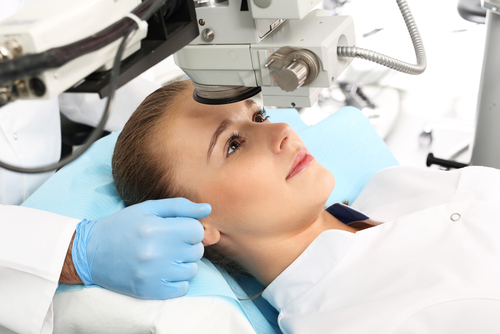Considerations pre-operative on the day of surgery
In the outpatient clinic, the discussion is made on the type of anaesthesia that is required. To be absolutely safe if general anaesthesia or sedation is required, refrain from having a meal for six hours prior to surgery. Small sips of fluid are acceptable.
It is important not to stop your systemic medications. For example, having a raised blood pressure on the day of surgery is hugely undesirable, hence medications to control this should not be stopped on the day of surgery.
Unless specified, do not stop your usual eye drops on the day of surgery
The nursing team will instil drops in the pre-operative setting. These will be broadly categorised as:
- Mydriatics
- Make the pupil bigger to access the part of the eye to operate on
- The bigger the better! It aids in helping with surgery
- Hence at least four lots of drops are instilled
- Typically the pupil dilation is required for surgeries such as cataract and posterior segment surgery
- Some mydriatics such as phenylephrine 10% may have an impact on systemic hypertension. Hence steps to avoid this can include:
- Punctal occlusion immediately after instillation
- Using phenylephrine 2.5%
- Miotics
- Make the pupil smaller
- This may be necessary in certain glaucoma surgeries such as trabeculectomy or putting in secondary lenses
Considerations post operatively
The type of surgery that is undertaken dictates the drop regime given. General principles include:
- Surgeries that are reliant on conjunctiva (such as glaucoma surgeries) will require preservative free drops. These will be minims.
- – Broad categories of drops include:
- Mydriatics
- These will make the pupil bigger
- Hence the vision will be blurry and not overly clear
- o Antibiotics
- Often these are stored in the fridge
- Steroids
- To reduce the inflammation
- Mydriatics
- The regime will be variable, depending on the type of surgery and surgeon choice
- For example, for cataract surgery a typical regime could be:
- Antibiotic four times a day for two weeks
- Steroids four times a day for two weeks, tapering to two times a day for two weeks
Typical do’s and don’ts:
- Use the clear shield on overnight for the first week or so
- If there is a opaque pad, take it off when you get home unless specified conversely. Ensure the shield is used at night-time (avoiding inadvertent rubbing of the eyes)
- Pre-existing eye drops should not be discontinued, unless specified
- A caveat to this is most types of glaucoma surgery, which will require stopping of pre-existing drops. This is the case for surgeries like trabeculectomy.
- Avoid heavy lifting for a week or so after surgery
- Bending over is acceptable
- Avoid swimming for a month or so after surgery

